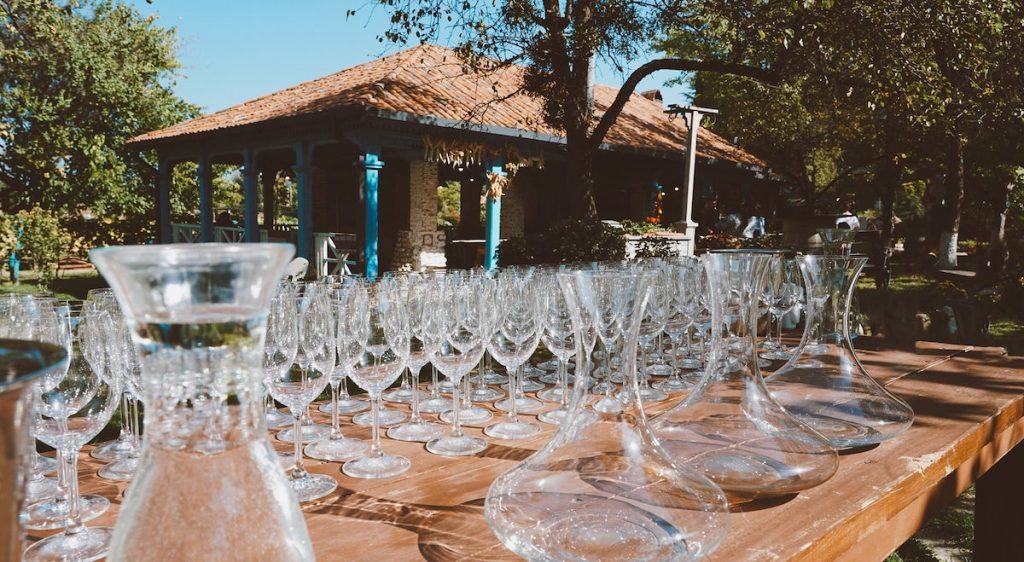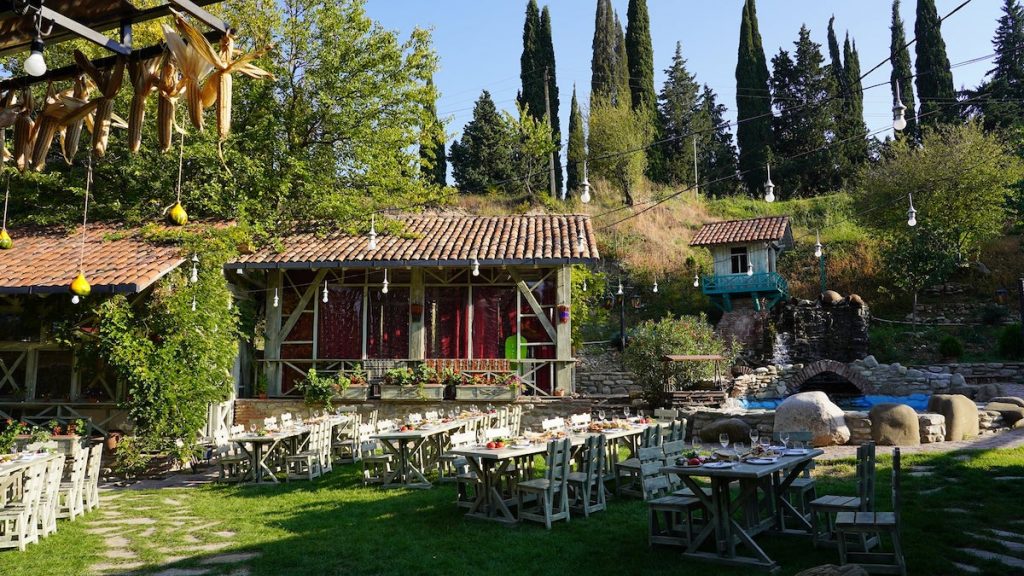Will tourists come to Georgia this summer?
For the second year in a row, Georgia’s tourism sector, which makes up for a large share of the country’s economy, has been put on hold. The main question that many are now asking is whether tourists will finally come to Georgia this year.
The winter season has been unsuccessful since the government closed all resorts amidst the pandemic.
Summer is just around the corner, and with only a month left until the busiest tourist season, tourist facilities would usually spend their time preparing for the arrival of visitors – renovate the space, receive reservations, and develop new services. However, barely any preparations are being made this year, as it is still unclear whether tourists will be able to visit the country at all.
Georgia is now experiencing the third wave of the coronavirus pandemic. Since April, the number of confirmed cases has increased, reaching approximately 2,000 cases per day, and up to 30 deaths daily. Meanwhile, vaccination rates are still very low.
The country has a curfew – from 23:00 to 5:00 and all movement is prohibited during this time.
Cafes and restaurants can only offer services on open terraces.
“Tourists will choose a place where they feel safe”, the tourism sector’s representatives share their pessimistic prognosis.

Meriko Gubeladze owns two popular restaurants in Tbilisi – Shavi Lomi and Leila. Today they work with a minimal workload, although most of the visitors are still foreigners.
“I don’t know if these people are here for business or leisure, but, to my surprise, 70% percent of our customers are foreigners. But this can barely be called work … Last year and the year before, I missed seeing the yard empty, there were always so many people here”, says Gubeladze.
She doesn’t expect anything to change for the better this year:
“If we look at what developed countries have done, how they are coping with the pandemic, how people are being vaccinated en masse, and then look at where we are currently at, obviously, no one will have any high expectations. A few people may come, but most will still choose and prefer places where they feel safe”.
At this stage, reservations are also available at one of the most popular and prestigious holiday destinations – the Lopota complex in the Kakheti region. However, there too, the number of visitors is nowhere near 2019 figures.
Maka Gligvashvili, commercial director of the Lopota complex, says the number of bookings has decreased by half compared to two years ago, and the complex will probably not catch up with these numbers, since the number of flights and visitors has also reduced significantly.
The managing staff of Lopota say that if the land border is opened and the curfew is lifted, the complex may be able to reach 60-65% of 2019 rates:
“We are waiting for the opening of the land borders, it is very important for Georgian tourism because 80% of tourists enter Georgia via land borders”, says Maka Gligvashvili.
“What should I expect ?! You know better than me that the season will be unsuccessful!”
Tsiala Shavadze owns a hotel and restaurant in Akhaltsikhe, in the tourist area of Rabat. The business started a few years ago as a small, family-run hotel and expanded very quickly. However, over the past year, her business has almost completely stalled. With no foreign tourists, prices for local visitors have been reduced, but it was enough to keep the business afloat.
The restaurant is now closed.
“The arrangement of the premises in accordance with the recommendations last season cost me 9,000 lari [about $ 2.6 thousand]. We have incurred these costs, but for what? The borders were not opened, flights were not resumed, tourists did not arrive. I wasted my money. They said – we will open, restore … If tourists do not come to the country, who will come to us? It will be worse this year,”, says Tsiala.
She has other plans for the summer – she registered on the website for legal employment in Germany and is waiting for an answer:
“I filled out paperwork for a seasonal job in Germany and got on the waiting list. I’m going to save my family, I don’t think about saving the business anymore”.
- Georgia: what fate awaits tourism?
- The Georgian Military Highway or ‘bottleneck’ of the Caucasus?
- ‘Frozen season’: How the pandemic affected Georgia’s winter resorts
- What are the new rules for entering Georgia?
Ineza Melikidze from Bakuriani owns a family hotel, an off-road vehicle hire and a bicycle rental business. She says that before the pandemic, she would have a total of 14-15 tours booked every month, but now she has no reservations or demand for her businesses.
“What should I expect ?! You know better than me that the season will be unsuccessful again. This year is the same failure as the last one. Nobody was interested in how we would survive. Even deferring bank loans at the start of the pandemic proved too expensive, and no one stuck up for us, they just threw 13,000 lari [about $ 3.8 thousand] at me”, says Ineza, adding that this year she will not be able to renovate the hotel for the season:
“Cosmetic repairs need to be done every year, vacationers are not taken care of, and if those works are not done on time, the customers will be unhappy. But I can’t do anything, I don’t have a penny. We depended on the winter season, and there wasn’t one”.
“The average bill per table used to be 150 GEL and now it is 75” –
Sofiko Chikhelidze owns a small hostel in the central district of Tbilisi. Before the pandemic, it was usually 95% occupied, now there are still some reservations, but not in large numbers and not at the same price that foreign tourists would pay.
Hostel Sofiko survived by offering services to local guests. This was also facilitated by the fact that many hostels simply stopped working:
“For example, if last year there were 205 hostels on Booking.com, now there are only 28 of them. Since hostels are still a cheap segment, there is a high demand for them. I was saved, for example, by the fact that some foreigners got stuck here last season. I had Belarusians and Italians staying here. Now I have guests who stay here when they need to change their house and need a place to stay for two weeks, some of them are also newcomers from Batumi”.
Compared to the previous year, in 2020 Georgia received 83.4 % less tourism revenue. In total, the amount received from tourism in Georgia decreased by $ 2.7 billion and amounted to $ 541.7 million.
► In 2011-2018, the growth rate of foreign visitors to Georgia was 15%, one of the highest in Europe.
Along with the increase in the number of visitors from abroad, the income from this sector also grew. For example, in 2018, tourism revenues were $ 3.2 billion, 19.1% percent higher than in 2017, and, almost three times more than in 2012 ($ 1.4 billion).
Restauranteur Meriko Gubeladze says that it is impossible to count on local tourism, as the ability of local residents to afford such things has sharply decreased.
“If the average Georgian table’s bill was 150 lari [about $ 44], now it is 75 lari [about $ 22]. People may come to a restaurant because they lack relationships, but their purchasing power is not what it used to be”.
Moreover, restrictions are a big problem for local tourism.
“Imagine taking a risk under these conditions, planning a meeting with friends, and then having to run away before the curfew [at the time of writing, the curfew started at 21:00. From May 16 it started at 23:00 – JAMnews] You don’t want to do that anymore. Better to have a get-together at home. Restricting work on weekends is also what kills us, it is absurd! I see pictures of many people gathering – in parks, at picnics – and I cannot understand why we are limited, we also have outdoor terraces. If it’s allowed Monday through Friday, why are you shutting us down on the weekend ?! It is as if they want to crush this business on purpose”, said the founder of the Shavi Lomi restaurant.
“The state does not have a plan”

The restrictions imposed in the country could be lifted within two weeks, Georgian Economy Minister Natia Turnava said on May 13, but did not specify how and to what extent.
“The state does not have a plan. They don’t have one, and neither do we”, says Shalva Alaverdashvili, founder of the Federation of Hotels and Restaurants. “This uncertainty is the problem that hurts business the most”, he said.
Shalva Alaverdashvili says that meetings with members of the government are held regularly, but these meetings are not accompanied by concrete steps and a tangible plan: “There is only one answer they give us – we are working on this issue, we are monitoring the epidemiological situation”.
“What can I say – nothing tangible. Promises remain promises. I have not seen any help or subsidies to help this business survive”, says Meriko Gubeladze.
Sofiko Chikhelidze, the owner of the hostel, says utility bills increased from January 2021. Moreover, the water supply company (GWP) demanded from business companies to deposit a total of 400 lari [about $ 117]: “If something happens and we go bankrupt, GWP will not suffer”.
To our question whether the sector will survive the failure of another season, Shalva Alaverdashvili answers without hesitation:
“We cannot survive it, we have already collapsed. More than 1,700 sites have closed down and will no longer be able to reopen. In fact, the tourism sector in the country has completely collapsed. Now we are starting to reassemble it, we just need to know what to expect, and we do not know. Unfortunately, I cannot solve the equation with three unknowns”.
Mass vaccination as a condition for saving tourism
The survival of tourism depends on the vaccination process, which has unfortunately failed, says Soso Berikashvili, Dean of the School of Economics at the Caucasus University:
“Even if we open the land border, tourists may not enter due to the epidemiological situation. They can come, from Russia, for example, but we do not want this, because this will be associated with additional risks. We have last year’s experience in Batumi. Therefore, caution is required. Obviously, the opening of borders is preferable, and for this mass vaccination is vital in order to create mass immunity”.
Soso Berikashvili says that in order to save tourism, the government must now actively work on boosting the vaccination process. On the one hand, it must talk with the suppliers of approved vaccines, and on the other, it must convince its citizens of the benefits of vaccination:
“But we know nothing other than superficial, vague, and contradictory phrases about the vaccination process, as well as about future tourism. Therefore, we have no guarantees, we do not know what to expect, and this uncertainty creates additional problems”.
Tourist administration has no answers
What is the plan and what is the tourism administration doing to attract tourists to the country? JAMnews has been waiting for an answer to this question from the Tourism Administration since May 13th. The PR department promised to answer our questions by e-mail, however, despite our numerous calls and requests, we still have not received an answer.
The National Tourism Administration has not had a head since October last year. Former leader Mariam Kvrivishvili became a deputy, but her successor has not yet been appointed.



















